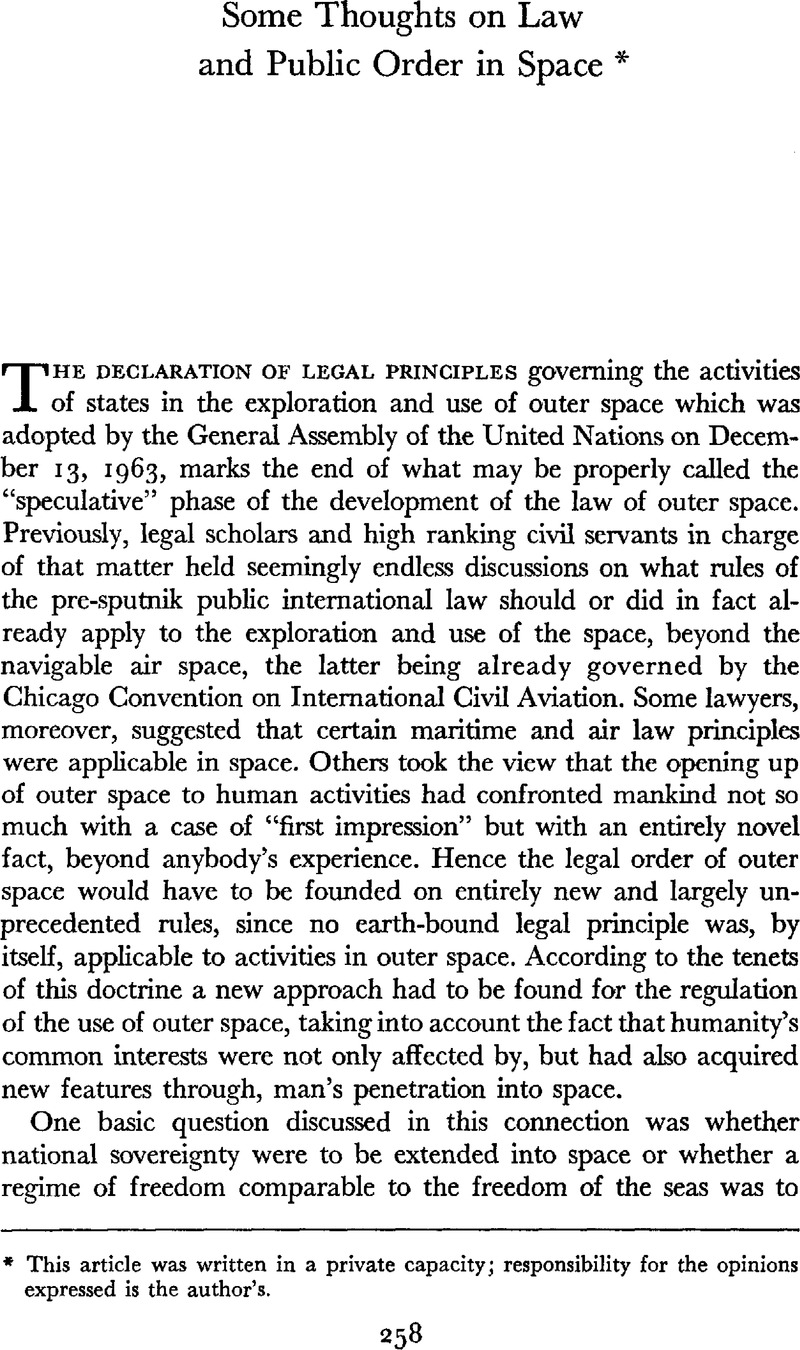No CrossRef data available.
Article contents
Some Thoughts on Law and Public Order in Space*
Published online by Cambridge University Press: 09 March 2016
Abstract

- Type
- Notes and Comments
- Information
- Canadian Yearbook of International Law/Annuaire canadien de droit international , Volume 2 , 1964 , pp. 258 - 269
- Copyright
- Copyright © The Canadian Council on International Law / Conseil Canadien de Droit International, representing the Board of Editors, Canadian Yearbook of International Law / Comité de Rédaction, Annuaire Canadien de Droit International 1964
Footnotes
This article was written in a private capacity; responsibility for the opinions expressed is the author’s.
References
1 Law and Politics in Space. Specific and urgent problems in the law of outer space. Proceedings of the First McGill Conference on the Law of Outer Space. Edited by Cohen, Maxwell Montreal: McGill University Press, 1964. Pp. 221 Google Scholar, with index and a selected bibliography (pp. 191–211). In addition to an introduction on “Law and Politics in Space” by Maxwell Cohen, the Proceedings contain papers on International Arrangements for Satellite Communications by George J. Feldman, Pollution and Contamination in Space by John A. Johnson, Space Technology and Arms Control by John T. McNaughton, Observation in Space by Leonard C. Meeker, The Prospects for a Regime in Outer Space and International Organization by Oscar Schachter, and The Prospects for a Regime in Outer Space by Myres S. McDougal, as well as summaries of the general discussions which followed each of these communications.
2 After a detailed analysis of official and private opinions on the lawfulness of space satellites, the authors of Law and Public Order in Space find “that it is becoming crystallized community expectation that the states of the world may, when their unique exclusive interests are seriously threatened by activities in space, lawfully exercise such an occasional exclusive competence as is necessary and proportionate for the protection of such interests.” More simply they conclude that a customary rule is emerging which permits the use of spying satellites. Acceptance, they say, “is maturing of an appropriately designed exclusive competence”: see p. 320. For other recent views on this subject, see the general discussion which followed Mr. Meeker’s communication at the McGill Conference, in Law and Politics in Space, supra note 1, at 91–93.
3 Law and Public Order in Space. By McDougal, Myres S., Lasswell, Harold D., and Vlasic, Ivan A. New Haven and London: Yale University Press, 1963. Pp. xxvi, 1147 ($15•οο U.S.).Google Scholar
4 See in particular McDougal, and Lipson, , “Perspectives for a Law of Outer Space,” 52 Am. J. Int’l L. 407 (1958).Google Scholar
5 Elsewhere the “principle of minimum order” is defined as follows: “Most comprehensively stated, this principle of minimum order embraces, it may be recalled, both a negative policy of minimizing coercive changes and a positive policy of promoting the shaping and sharing of values by persuasion. In its negative formulation, the principle seeks to prohibit any unilateral use of intense coercion by one community against another as a deliberate instrument of special interest. In its positive formulation, the principle seeks to promote that stability in expectations of freedom from arbitrary coercions which is indispensable to the fullest cooperative activity in the production and distribution of values” (page 407). The more desirable “optimum order“ which the authors consider difficult to achieve is defined as “opportunity to maximize position, potential, and expectancy with respect to all values.... [It will] reinforce demands for the freest and fullest use of all potential resources” (page 195).
6 For a more complete analysis of this approach, see Mankiewicz, R.H., “De l’ordre juridique dans l’espace extra-aéronautique,” [1959] Annuaire Français de Droit International 103.CrossRefGoogle Scholar
7 Mankiewicz, R.H., “Satellites, agents de paix,” [1959] Revue de l’Université d’Ottawa 63.Google Scholar




